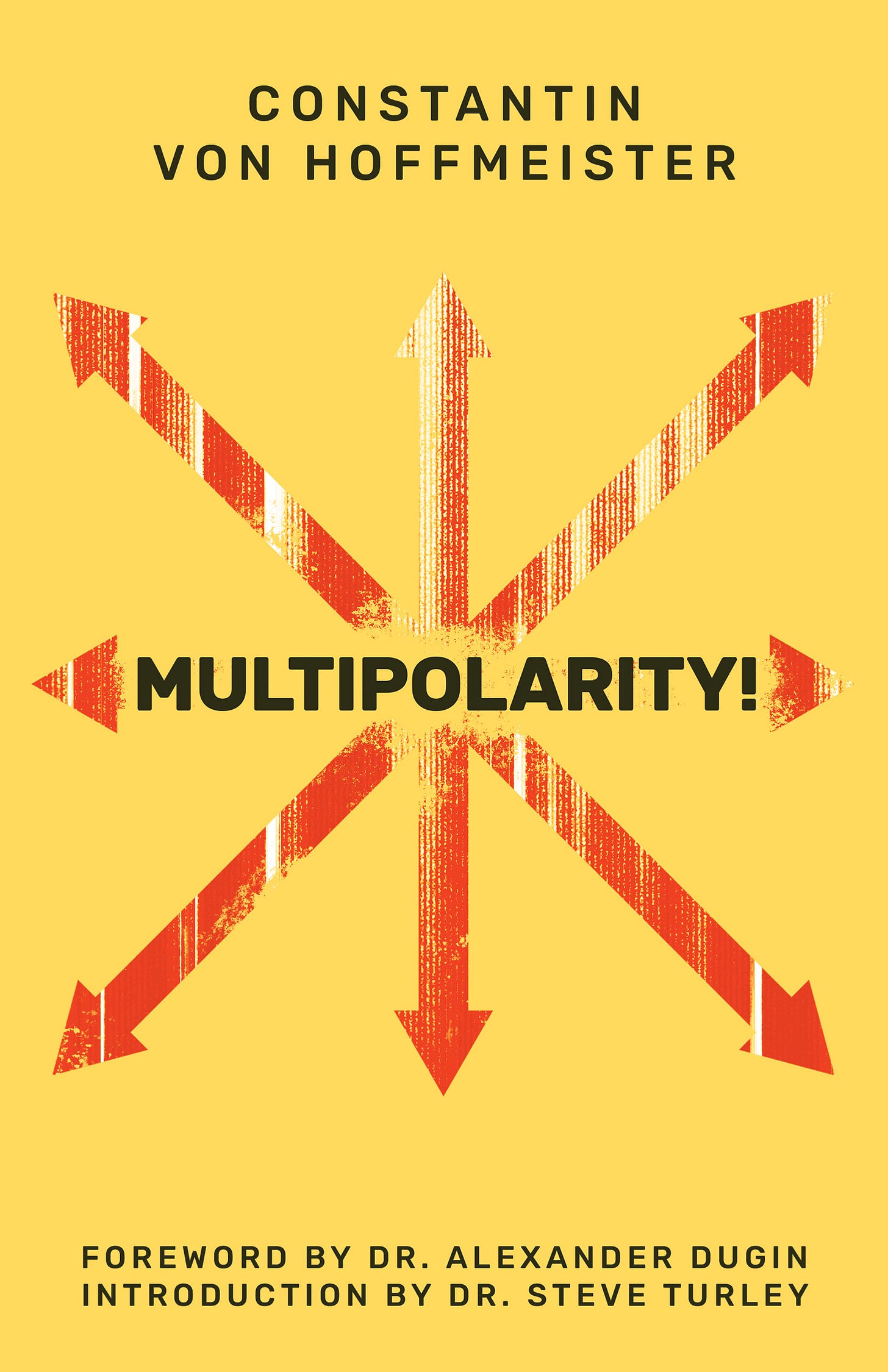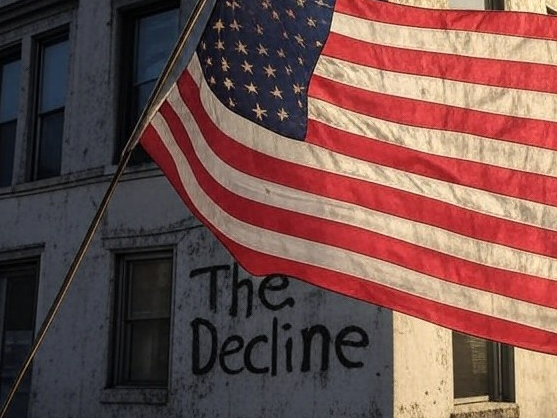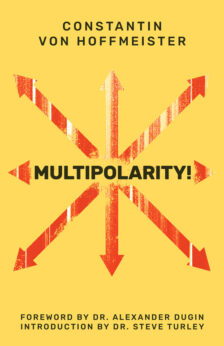This is an excerpt from Constantin von Hoffmeister’s MULTIPOLARITY! (Arktos, 2025).
The American lawyer and conservationist Madison Grant (1865–1937), in his book The Passing of the Great Race, provided a stark analysis of the perilous trends threatening the racial and cultural foundations of America. He emphasized that the strength of the nation was rooted in its “Nordic backbone,” the lineage and values of its original settlers. Today, that foundation is increasingly undermined, as demographic shifts accelerate the erosion of the racial stock Grant saw as essential to the nation’s identity and vitality. His dire warning is more valid now than ever: “These immigrants adopt the language of the native American [= White American], they wear his clothes, they steal his name and they are beginning to take his women, but they seldom adopt his religion or understand his ideals and while he is being elbowed out of his own home the American looks calmly abroad and urges on others the suicidal ethics which are exterminating his own race.” For Grant, this process is not simply a matter of cultural assimilation. It is an existential threat, a betrayal of the ancestral heritage that had built and defined the American nation.
Grant argued that the challenge went beyond numbers, encompassing the ideals and traditions that made America distinct. The “suicidal ethics” he decries reflect a loss of racial pride and self-preservation among the native (White) population, replaced by misguided universalist ideals that encouraged the displacement of its own kind. In his view, the immigrant masses, although adopting surface-level aspects of American culture, failed to internalize its deeper values, thus threatening to dilute and ultimately replace the ideals installed by the nation’s Founding Fathers, whose goal was to establish a White Republic for “free White men.” To Grant, the true danger lies in the complacency of (White) Americans themselves, who, while witnessing the transformation of their homeland, continue to champion policies and attitudes that hasten their own demise. He saw this as a call to awaken — to safeguard the ethnocultural heritage that had been entrusted to them by their ancestors and to recognize the peril of abandoning the principles of self-preservation and racial integrity.
Today’s America is not the decline of a melting pot but the gutting of a society once unified by a dominant culture. Instead of assimilation, there is disintegration. Immigration policies favoring the mass influx of populations alien to the founding stock have accelerated the decline. The great warning signs are all there: porous borders, fragmented cities, and a politics of division that celebrates “diversity” (the fake kind) while dismantling unity (based on homogeneity). This is an America losing its demographic ballast, surrendering its character to numbers that grow without cohesion or reason. In the heart of the country, in towns where flags once flew for shared principles and shared genes, there is now only silence or discord. The decline of the White American majority is not just statistical; it is existential. A cultural black hole forms where there was once a confident, singular, truly American outlook on the world, replaced by competing tribes whose loyalties lie elsewhere (mostly abroad).
The southern border is not a line but an open wound, bleeding turmoil into a country already distressed. Illegal immigration is a veritable dismantling of the original American identity. Tens of millions enter with no intention or ability to assimilate, their presence not a complement to the existing culture but a challenge to it. Drug cartels wield power at the margins, trafficking not only narcotics but people, while the strain on resources — schools bursting, hospitals overcrowded, police stretched thin — turns American cities into desolate areas where survival is not guaranteed. Yet the elites insist this is “progress,” framing the dissolution of borders as moral enlightenment. The heartland watches, powerless, as the scaffolding of its country collapses due to the pressure of imported mayhem. The demographic shift is deliberate, a replacement of the original builders with a globalized, rootless population that serves economic masters but not the spirit of the nation.
America’s heartland now bleeds out in plain sight, its towns and villages bearing the scars of a nation in decline. The demographic strength that once defined the country — families sprawling across farms, communities bound by blood and common ground — has turned into a slow-motion collapse. Suicide eats away at the youth — indeed at all ages, suicide is the number one cause of death for most White Americans — despair coils in the older generations, and in some towns, life expectancy now reflects the grim statistics of forgotten third-world countries. The land of opportunity has become the land of opioid overdoses and “For Sale” signs in Chinese. This is not conquest; it is a void, an internal collapse where the cohesion of shared ideals, identity, and meaning dissolves into nothingness. America’s soul, once a roaring engine of faith in the future, sputters and fades into a murky fog of individualism, alienation, and quiet despair. America, in a real sense, has become its first victim: the American Indian. The juggernaut of Anglo-Americanism that saw the erasing of American Indian cultures either through war, alcohol addiction, disease, early death, squalor, and a destruction of cultural identity for the invention and propagation of the same liberal American identity of nothing has now caught up to all Americans. The majority of Americans all live on reservations. The Indian reservation was once on the periphery, the new reservation is wherever you are.
As the heartland crumbles, the nation’s industrial spine rots alongside it. The factories that once belched smoke and promise into the sky are now carcasses of clanking machinery and smashed windows. For decades, globalism’s golden carrot dangled before the elites, and they bit down hard, hollowing out America’s manufacturing base for offshore profits and bottom-line efficiencies. Vibrant industrial towns, where generations clocked in and built more than just products, namely a sense of shared pride, now lie silent, their purpose ripped away by capital flight and a drug epidemic. Men and women whose labor once meant something — whose hands shaped steel and the land of tomorrow — now drift in economies that treat them as excess baggage. Industry was not just the backbone of America’s economy; it was the backbone of its communities, and its absence is a death knell for the telos that once motivated them.
And still, the elites sip champagne on balconies of power, gazing out over a cratered landscape as though it is all a natural course of “progress.” Global capitalism rolls on, enriching the few while trampling the many, leaving ghost towns and silent factory floors as monuments to its indifference. Automation and artificial intelligence — the slick, polished idols of modern economics — displace workers faster than they can adapt, while the gig economy carves up labor into scraps, a hustle here, a delivery there, dignity scattered like breadcrumbs. “Progress,” they call it. But for the people left behind, “progress” looks like eviction notices, like addiction, like an endless grind towards nowhere. The technology that promised liberation has shackled them in chains of irrelevance, and their pain fuels the empty vacuum of a culture addicted to the myth of innovation.
Order MULTIPOLARITY! here.










A few concluding chapters remain to be written documenting AmeriKa’s denouement. Perhaps, given its spectacular rise and agonizing demise, a worthy epilogue can be fashioned that does not conclude with the well-known quote, “This is the way the world ends. Not with a bang but a whimper.”